What's in a Foot? December 31, 2022 Marks End of U.S. Survey Foot
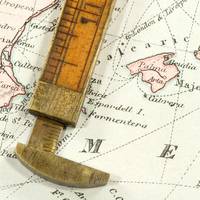
NOAA and the National Institute of Standards and Technology (or NIST) are starting the new year off on the “right” foot.On New Year’s Eve, the two federal agency partners will officially retire the use of one of two measuring feet, to reduce surveying errors that can cost money.Discontinuing the use of the U.S. survey foot and embracing of its replacement — the international foot — are also part of NOAA’s modernization of the National Spatial Reference System.“Officially retiring one of these measurements will reduce accidental confusion in engineering…
Port of Corpus Christi Obtains Texas Cybersecurity Certification
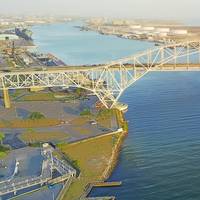
The Port of Corpus Christi has become the first port in the state to obtain the Texas Cyberstar Certification, issued by the Texas Department of Information Resources (DIR).The Cyberstar Certificate Program was launched in May by the Texas DIR to recognize public and private organizations in the state that voluntarily meet specific criteria for cybersecurity best practices.“We remain committed to our CyberSecurity program at the Port of Corpus Christi. Our cyber team consistently strives to reach new milestones and protect against an ever-changing threat landscape…
SAFE Boats to Reopen Tacoma Shipyard for Naval Build Program
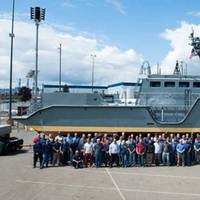
U.S. shipbuilder SAFE Boats International will reopen its Tacoma, Wash. facility following the award of a $20 million lead contract for the U.S. Navy to start construction of the Mark VI patrol boats headed for the government of Ukraine.The U.S. Navy announced in January it had awarded SAFE Boats a portion of the contract to purchase long-lead material and associated pre-production and planning support with the remaining $80 million award anticipated in June.SAFE Boats’ Tacoma…
DCSA Releases Cyber-Security Guide
The Digital Container Shipping Association (DCSA), a non-profit group of nine major ocean freight carriers, has rolled out its cyber security guidance to prepare shipowners and vessels for the International Maritime Organization’s pending cyber security mandate.The best practices outlined by DCSA provide all shipping companies with a common language and a manageable, task-based approach for meeting the IMO’s January 2021 implementation timeframe, DCSA said in a statement.IMO’s Resolution MSC.428(98) on Maritime Cyber Risk Management in Safety Management Systems was adopted in 2017 to ensure that vessels’ cyber risks are appropriately…
Business and Personnel Considerations in the Age of Autonomous Ships:
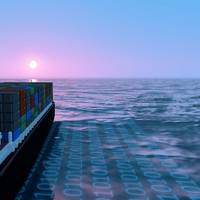
There is much talk among maritime professionals about how automation and autonomous vessels will make the industry safer. In truth, innovation will be driven by the bottom line and will take time before it is commonplace in the industry. Early examples are likely to be limited to smaller vessels and coastal waters. Autonomous ships are predicted to reduce human error, a major driver of accidents, but crews will still have an important role on board vessels for the foreseeable future.Recent TrialsIn December 2018…
Cyber Hack: Fortifying Maritime, Port Security

The United States Coast Guard Marine Safety Alert 06-19 (USCG MSA 06-19) outlines a February 2019 incident aboard a deep draft commercial vessel that called on the Port of New York / New Jersey after experiencing a significant cyber incident that impacted their shipboard network. The Safety Alert stated in part:“An interagency team of cyber experts, led by the Coast Guard, responded and conducted an analysis of the vessel’s network and essential control systems. The team concluded that although the malware significantly degraded the functionality of the onboard computer system…
ClassNK Releases Cyber Security Approach
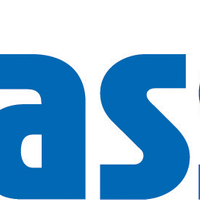
Classification society ClassNK has released the ClassNK Cyber Security Approach which outlines its basic approach to ensuring onboard cyber security for ships. It was released alongside its Guidelines for Designing Cyber Security Onboard Ships for newbuilding designs as the first part of the ClassNK Cyber Security Series which incorporates requirements for taking onboard cyber security measures.Response to cyber threats is an urgent matter for the entire maritime industry. The…
ABS Answers USCG Call for Port Cyber Security

New solution incorporates National Institute of Standards and Technology Cyber Security Framework (NIST CSF). ABS Advanced Solutions announced a first-of-its-kind cyber security solution to aid regulated maritime facilities in complying with US Coast Guard (USCG) guidance. The suite of services provides a turnkey solution for port and terminal facility operators responsible for maintaining USCG regulated Facility Security Plans (FSPs).In 2017, the USCG announced the intent that regulated maritime facilities in the United States address cyber security in their FSPs.
USCG Implements Handheld Technology for Onboard Oil Testing
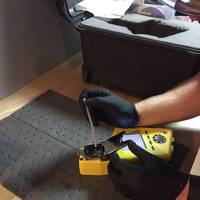
With a motto of Always Ready, the United States Coast Guard (USCG) has 11 missions specified by law including drug and migrant interdiction; ports, waterways and coastal security; fishery patrols; search and rescue; and national defense. The USCG’s newest ships including 22 Fast Response Cutters (FRCs) recently entered service with 36 more on order and six new National Security Cutters (NSCs) with two more in the process of being built. Oil analysis plays a critical role in the…
Cyber Incident Response for the Resilient Organization
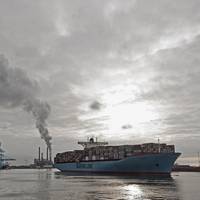
Even prior to NotPetya, regulatory bodies, insurers, P&I clubs, port authorities, and other segments of the maritime industry started taking steps to minimize the industry’s exposure to cyberattacks.The maritime industry has had an awakening. We have awoken to the fact that digitalization has woven its threads throughout the industry, and we have greatly benefited from being able to operate in an interconnected cyber environment. Likewise, being able to transmit shipboard machinery diagnostic information to shore-side operations centers…
USCG Releases Draft Cyber Guide for Maritime Facilities

Cyber risk has hit a critical peak within the maritime industry, and the significant impact of the Petya ransomware attack on scores of maritime entities only amplifies it. The attack effectively shut down major ocean carriers, including shipping conglomerate Maersk, and impacted marine terminal operations across the globe. Every maritime company, no matter the size or business function, is a potential target. The industry has seen a recent wave of guidelines and resolutions from maritime regulatory bodies related to maritime security and cyber risk mitigation.
Hyper Connectivity: The Risks and Rewards
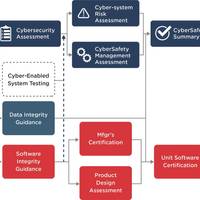
The maritime industry is becoming more connected – at sea, on land and in between. This trend has given rise to a cyber-enabled fleet that continues to adopt greater levels of automation and operational complexity. For the end user, the benefits of modern shipping are multiple. For the ship owner or operator, however, every incremental advance of technology creates new entry points for risk. In this hyper-connected era, defending against the introduction of new risks as technology changes demands a recommitment to systems engineering and…
Cyber Security In Shipping & Offshore Ops
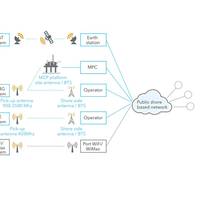
Global shipping and offshore oil and gas operations are increasingly dependent on integrated networks, based on various software and data transfer solutions. Systems and equipment onboard are interconnected, monitored and controlled through an onboard automation network. Onboard systems are increasingly also connected ashore to the owners’ or technology providers’ control centers. Equipment manufacturers want to remotely upgrade the software of their systems and monitor their use to be able to optimize operations and to scheduled needed maintenance service.
Spotlight: Cyber Risk Management
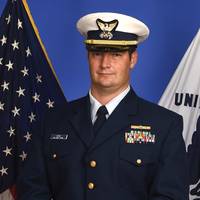
An increasing number of systems on ships and at marine facilities depend on cyber technologies for routine operations. While cyber technology has improved efficiencies in the marine industry and around the world, it has also created potential vulnerabilities. For example, the towboats that move goods through the Western Rivers and along our coasts rely heavily on electronic navigation systems, including Automatic Identification System (AIS) and Global Positioning System (GPS), to safely transit around riverbends, capes, and shoals.
Harris CapRock Communications again Top Independent Operator
For the fourth consecutive year, Harris CapRock Communications has been ranked number one on The Independent Top Twenty listing by the World Teleport Association (WTA). The company also ranked fifth on The Global Top Twenty in 2014 based on total revenue and year-over-year growth. “The WTA’s annual December announcement serves as a definitive marker of the state of the industry and the direction of its leading service providers in the year to come,” said Tracey Haslam, president, Harris CapRock Communications. “With teleports on six continents, we provide service coverage to nearly any point on the globe. Harris CapRock’s teleports consistently meet the highest requirements for Department of Defense and National Institute of Standards and Technology compliance for confidentiality…
Marine Cybersecurity: Is Your Ship Safe? Are You Sure?

On February 12, 2013, President Obama issued Executive Order 13636 – Improving Critical Infrastructure Cybersecurity. Citing repeated electronic intrusions into critical infrastructure, the document states that it is the policy of the United States Government to increase the volume, timeliness, and quality of cyber threat information shared with U.S. private sector entities so that these entities may better protect and defend themselves against cyber threats. It directs the Secretary of Homeland Security (DHS)…
Retlif’s Poggi Receives IEEE Wheeler Award

Walter A. Poggi, President and CEO of Retlif Testing Laboratories, Inc., was recognized with IEEE’s Harold Wheeler Award for his contributions to the industry and to Long Island during his 35 years at the helm of the independent testing organization. Awarded by the Long Island Section of IEEE, the Harold Wheeler Award recognizes IEEE members who have “demonstrated outstanding technical and management abilities.” Under Mr. Poggi’s guidance and stewardship, Retlif, an EMC/EMI and Environmental testing leader since 1978, has grown dramatically.
DHS Adopts Detection Equipment Standards
The U.S. Department of Homeland Security (DHS) issued a Press Release stating that it has adopted standards for radiation and nuclear detection equipment for its personnel and other first responders. The standards, which address, among other things, pocket-sized instruments to be carried on the body and instruments for detection of photon-emitting radioactive substances, were developed in cooperation with the Department of Commerce’s National Institute of Standards and Technology, the Department of Energy’s National Laboratories, the Institute of Electrical and Electronics Engineers (IEEE), and the American National Standards Institute (ANSI). (HK Law)
Seacoaster Merges Surface Effect Ship with Catamaran Design
Air Ride Craft, Inc., Miami, has developed a new marine vehicle that promises to revolutionize the fast-craft industry. The Seacoaster combines the best features of the Surface Effect Ship (SES) and the catamaran. The vessel is the subject of extensive ongoing patent efforts both in the U.S. and internationally. It is applicable to all manner of marine craft markets including commercial and military. · Offers pricing comparable to other craft due to its simple low cost design. The first of these new vessels will go into service on Lake Erie this summer as a 44 knot, 150-passenger ferry for Island Express Boat Lines Ltd., Sandusky, Ohio. The passenger ferry, called Island Rocket II, is depicted in an artist's drawing in Figure 1. The 72 ft.





